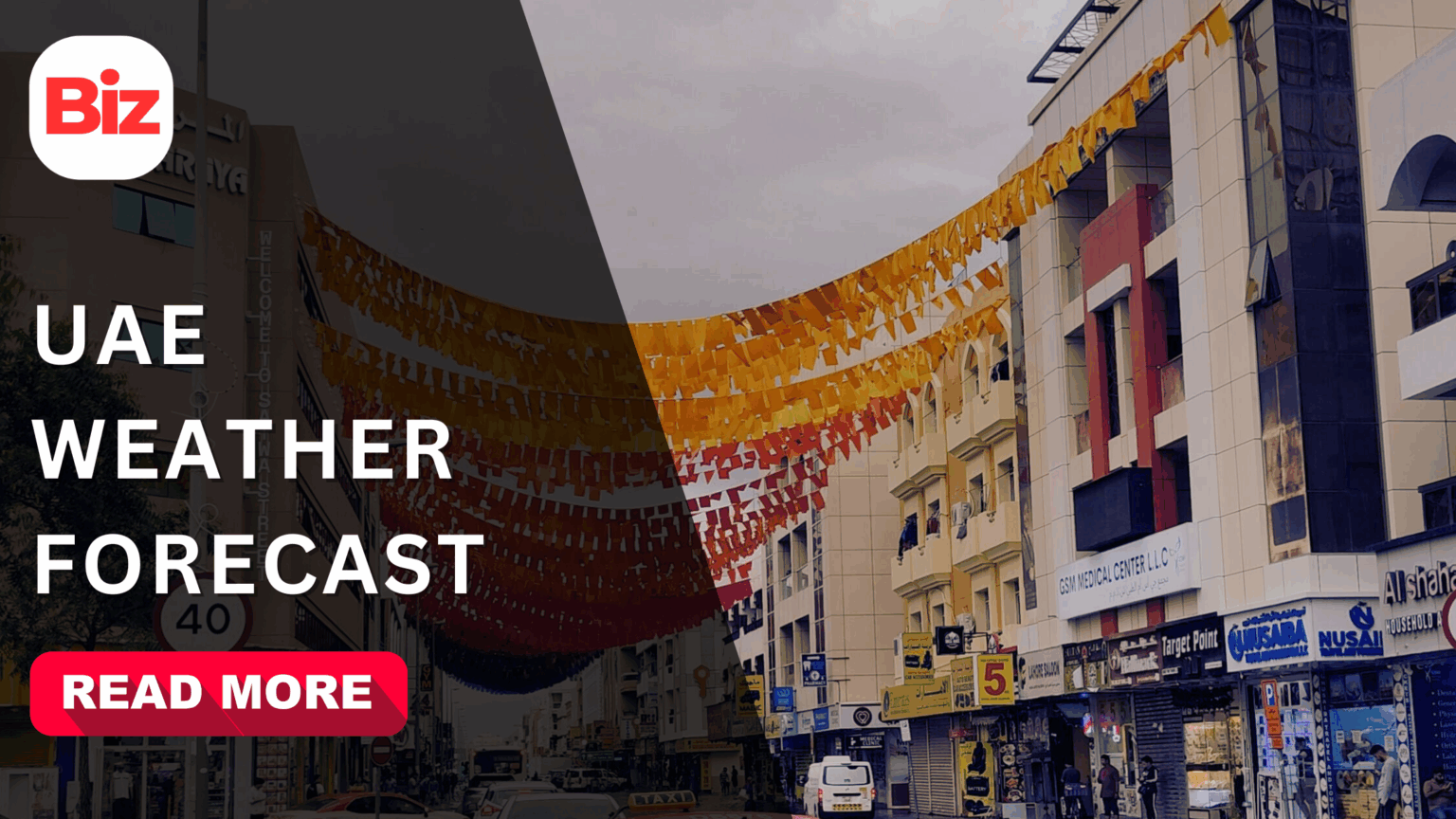The United Arab Emirates UAE Weather will have to endure another wave of extreme summer. with the National Center of Meteorology (NCM) and global forecasters predicting high temperatures, widespread haze, and extremely poor levels of air quality extending well past the last days of August in the first week of September.
Temperature Outlook
Saturday, August 30: max. temperatures between 42C and 31C, min. temperatures between 31C to 26C. Conditions: Hazy, very unhealthy air quality.
Sunday, August 31: High of 39°C, low of 31°C. Mostly sunny, further hazy, poor air quality.
Monday, September 1: High of 38°C, low of 31°C. Slight cloud cover possible, but overall hazy.
Tuesday, September 2: High of 37°C, low of 31°C. There is still a very unhealthy air quality, and it may influence inland visibility.
Wednesday, September 3: High of 38°C, low of 32°C. Persistent haze.
Thursday, September 4: High of 39°C, low of 32°C. Mostly sunny, with hazy conditions.
Friday, September 5: High of 40°C, low of 31°C. Hazy and very warm.
The temperatures in the coastal and inland areas of the UAE will reach up to 37-42 C (98-108 F) during the daytime and stay humid at night at temperatures below 31 C rarely. The humidity will increase the feels-like temperature by several degrees above in coastal cities like Dubai, Abu Dhabi and Sharjah.
Air Quality Concerns
Air pollution is a major problem in UAE weather this week. The Air Quality Index (AQI) is predicted to remain in very unhealthy category in various emirates mainly because of dust, humidity, and urban emissions.
It is strongly recommended by health specialists:
Avoiding excessive time spent outside, particularly by children, the elderly, and asthmatic or respiratory patients.
Using protective masks, when spending a long time outside.
Cleaning indoor air by means of air conditioning or purifiers.
Advisory from Authorities
The National Center of Meteorology (NCM) has given warnings to the citizens and tourists to:
Avoid direct sun exposure during midday hours (11 AM–4 PM).
Consume large amounts of water to shun the risk of dehydration.
Wear sun protection in the form of wide-brimmed hats, sun glasses and SPF-rated sunscreen.
Be careful because highways and desert roads can be affected by haze and a lack of visibility.
Seasonal Context
The height of the summers in UAE weather in late August and early September and it is typified by:
Scorching heat in the day which frequently exceeds 40C on the thermometer.
The humidity is very heavy, particularly in the Gulf areas, and things are oppressive at night.
Low amount of rainfall and most of the precipitation is experienced during the winter months (November-March).
Although some regions of the UAE receive short-lived summer precipitation in mountainous regions, e.g. Fujairah or Ras Al Khaimah, forecasters emphasize that no major rainfall will occur throughout the country during this week.
key impacts on students
Activities in the outdoor limited.
Sports lessons, assemblies and outdoor play can be restricted or rearranged.
A large number of schools will either move physical education (PE) into gym halls or delay vigorous work.
Health Concerns
The poor air quality exposes children to heat exhaustion and dehydration and breathing difficulties.
Schools should have inhalers and medical personnel on duty as students with asthma or other allergies are more likely to fall ill.
Transportation Challenges
The trip to and back school can be tedious and the buses are not covered with air conditioning against the sun.
Parents are also encouraged to bring children with water bottles and light weight clothes to encourage reduced heat stress.
Classroom Comfort
The facilities are supposed to be strained with excessive use of air conditioning systems.
Schools are tightening their belt on cooling to ensure safe indoor conditions.
Official Guidance for Schools
Schools have been reminded by the Ministry of Education and local authorities to:
Stabilize the hydration of students by having an unrestricted access to water during the day.
Keep a watch on outdoor exposure, halting the activity on a bad air quality day.
Teach students sun safety, the use of hats, sunscreen, and shade.
Increase medical preparedness through staff preparedness to heat-related illnesses.
Parents’ Role
The parents are also encouraged to assist children by:
Bringing an extra supply of water and light, breathable uniforms.
Making sure that children have sufficient rest and sleep because hot nights may upset schedules.
Reminding children to take a break in playing outside after school.
Long-Term View
Meteorologists say that UAE Weather is not extraordinary in the UAE in August and September. But, because of the extreme heat and extremely poor quality of air this year, there has been a greater concern about vulnerable populations, especially among young students.
As the conditions are not expected to improve until mid-September, schools might have to continue being strict on weather-related strategies long into the first weeks of the new term.
Looking Ahead
It is unlikely that the weather pattern changes in the near future until mid-September, when slightly lower temperatures and the quality of air start changing due to slow seasonal changes. The residents should be prepared to spend extended periods of heat stress, decrease in visibility because of haze, and air quality difficulties until that time.
FAQs
1. Will it be raining in UAE this week?
No. There is virtually no possibility of rain in between August 31 and September 5 according to the predictions and climate data. The sky will remain mostly clear and there is haze and dust.
2. What will the temperatures reach in the next few days?
It will have daytime temperatures varying between 37degC and 42degC and night temperatures will maintain a warm 31degC to 32degC. In coasts, it will be even hotter due to the high level of humidity.
3. How come that the air quality is regarded as very unhealthy?
A mixture of dust, suspended particles, humidity, and emissions is causing air quality to be impacted. This forms unhealthy breathing environments particularly in the cities.
4. Who is most vulnerable to bad air quality and excessive heat?
Children
Elderly residents
People with asthma or respiratory problems
Long-time outdoor employees.
5. When is the weather going to improve?
Weather conditions normally improve in the mid to late September, when the temperature slowly decreases and the humidity is also reduced. During winter (November-March), considerable rainfall is often followed.
6. In what locations can residents access official updates?
The official channels of the National Center of Meteorology (NCM) release real-time information, such as warnings of temperature, haze, and air quality on their websites.








